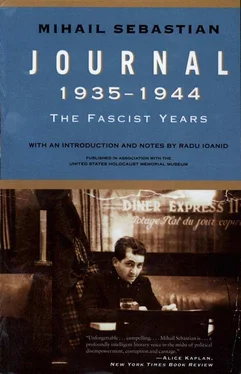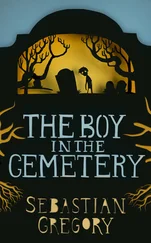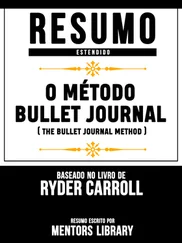I have heard a lot of beautiful pieces: a wonderful piano concerto (the third) by Prokofiev, Rhapsodie Espagnole by Ravel, a suite for string orchestra by Corelli-Pineli, Beethoven’s Third Symphony (conducted by Molinari), Tchaikovsky’s Violin Concerto, Jacques Ibert’s Escales, Respighi’s Fountains and Fines of Rome.
I don’t know why it is so long since I have written here. Disgust at dwelling so much on myself. . But this evening I am pleased that I stayed home and read a book (Esquisse d'un traité du roman, by Léon Bopp); I shall correct the proofs of Oraşul cu salcîmi. 7I have allowed myself too many wasted nights recently.
Tonight, after the opening of the opera season, we went to Zissu. Maryse was wearing a delightful white dress (like a film actress), Gheorghe in evening dress, Marietta Sadova too, and myself in a tuxedo. Few people, excellent atmosphere, whisky, cocktails, cigarettes. We danced a lot. Maryse was movingly delicate and sensitive, saying many things that disarmed me with their sincerity and forthrightness. “You don’t know how much I love you.” And I am stupid enough to be flattered by that.
Yesterday morning, at Alcalay, 8a guy suddenly came up to me with outstretched hand, smiling heartily and eager to talk.
“Are you angry with me?”
“Angry?” I held out my hand without knowing who he was. Ocneanu then introduced us.
“Mr. Niculae Rosu.” 9
I was taken aback by the thoughtlessness of it all. “I don’t bear grudges,” he said to me several times.
I greatly enjoyed using a formal style of address with him all the time.
“You see, my dear sir, I am not angry. But one thing I must say: your bad faith is monumental.”
He grew pale and spluttered something. Ocneanu wrung his hands and tried to make peace between us — but I kept calm, continuing to speak with exaggerated politeness. It was the only way I could hide my repulsion.
The man was a walking platitude. He spoke to me about the Jews— about how they are intelligent and cultured, how they are this, that, and the other. He holds Jews in high regard. He holds me in high regard. He reads what I write, always has. My culture, my style, my talent, etc., etc.
I let him talk, feeling a wonderful satisfaction as he sank beneath the weight of all those platitudes, retractions, and courtesies. It all became clear to me in the end. The poor man is publishing a book and — as he put it without mincing his words — he would not like it to be reviewed in the manner of Pandrea. 1
“I’ll send you the book,” he said as we parted.
What a man! I don’t remember ever meeting such an abject character. But let’s calm down! I can see I’m becoming pathetic.
I have given up following the stages of my love affair (?) with Leni. So many contradictions, so many resumptions, so many blunders, so many discarded projects. I saw her yesterday — and I was quite simply happy at the fact. But it will pass, it will pass.
1:00 a.m.
A Piatigorsky concerto. Frescobaldi, Toccata. Boccherini, Sonata in A Major. Bach, Suite in C Major (unaccompanied cello; I think I heard it once from Leipzig last winter). Weber-Piatigorsky, Sonatina in A. Schubert, Arpeggione sonata. Scriabin, Poems. Glazunov, Spanish Serenade. Ravel, Habanera. De Falla, Dance of Terror.
Bach: Passacaglia in C Minor.
Mozart: Piano Concerto in C Major. Soloist Wilhelm Kempff.
Brahms, Symphony No. 1.
Yesterday evening from Vienna, Beethoven’s fourth and fifth symphonies. Weingartner.
The evening before last, from Juan-les-Pins, fragments from Ravel’s Ma mère l’oye and Haydn’s Farewell Symphony.
A long lunch today at the Institut Français.
Kempff and the Philharmonic on Sunday at the Ateneu — three Beethoven piano concertos, in C minor (op. 37), in G (op. 58), and in E-flat (op. 73)-
Some moments of overwhelming emotion, greater than any I have ever had before in music. And a kind of nervous tension, a kind of continual vibration, had me in its grip all day.
It was nice to have Lilly 2beside me. Farther away, in a box, Jeni.
A wonderful evening on the radio. From Zurich a concertino for cello and harpsichord. A sonata by a classical composer whose name I do not fully recall (Andrea something?), the Handel-Goldschlager Variations (for unaccompanied harpsichord), Adagio by Tartini, Rondo by Boccherini.
From Warsaw a trio for piano, oboe, bassoon by Poulenc, remarkable for its humor and inventiveness (presto, andante, rondo.)
Later, also from Warsaw, a sonata for orchestra by Corelli, Beethoven’s Piano Concerto in C Major (very Mozartian — which still leaves one before I know all five), and lastly, Prokofiev’s Classical Symphony.
An amusing visit to Dorina Blank, who offered herself with no talking in circles. A moving letter from Sulutiu. 3I’d never have guessed he was such a persistent “admirer.”
Yesterday evening at the Philharmonic. Mozart: Symphony in E-flat (horribly played), Haydn: Cello Concerto in D Major (Cassado), Tchaikovsky: Variations on a Rococco Theme for Cello and Orchestra, Stravinsky: The Firebird.
Evening
What could I still hold against Leni after our talk today? She was nice, kind, and affectionate, without being falsely smart in any way. Little coquetry, a few impulsive outbursts, and above all no hypocrisy of any kind. She will come to my place if I ask her. She could scarcely say that it is hard to receive me at her place because of Froda, but she hinted at it pretty clearly. (Anyway, there was no need, because he phoned while I was there and the maid sort of stammered on the phone that “the lady is reading”—a lie that embarrassed Leni.)
We walked in the street for half an hour or so, and I said a lot of foolish things. She, on the other hand, said something wonderful, which I shall try to recall. “It’s true I’m capricious, flirtatious, and frivolous. But I have never done anything merely out of coquetry, caprice, or frivolity.” I regret that I can’t remember her exact words. She found a much more suitable expression.
So here I am at a peak of “happiness.” Satisfied?
I have just returned from Galaţi, where I spoke yesterday evening at the Liberty circle.
I don’t think it is immodest that I enjoy being able to hold the attention of a hall full of people for an hour — while speaking of things that are alien or indifferent to them. During the lecture I had great fun with a host of things that I came up with as I was carried along by the rhythm of speaking.
How many things I should have noted down! But I don’t think I have ever been quite so swallowed up in things (things I don’t even carry through to the end: instead I bustle about making them more complicated and putting them off. .).
I should say a word or two, and even more, about Nae’s inaugural lecture. This year he is giving a course on “political logic.” His introduction was a little testament of the Iron Guard faith. He flattered the students with an electioneer’s persistence, praising “the political generations” as being in the right against “the bookish generations,” whose great sin, in his eyes, is that they are bookish. Politics means action, life, reality, contact with existence. Books are abstract. So you are right to do what you are doing; the truth is with you, rah, rah, rah!
Читать дальше











